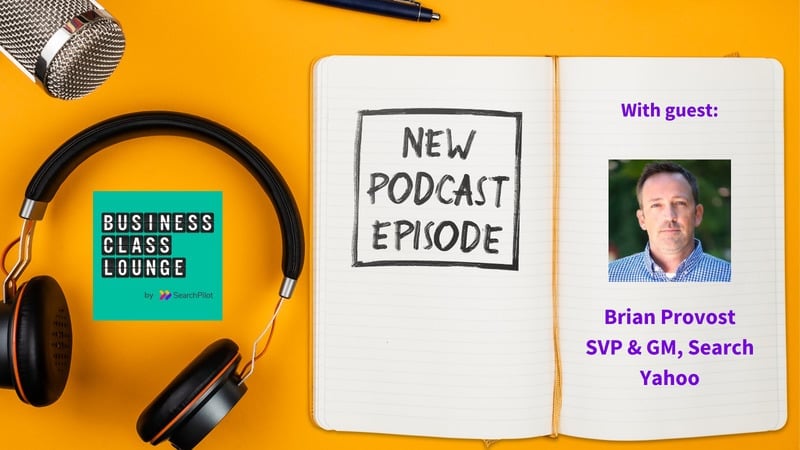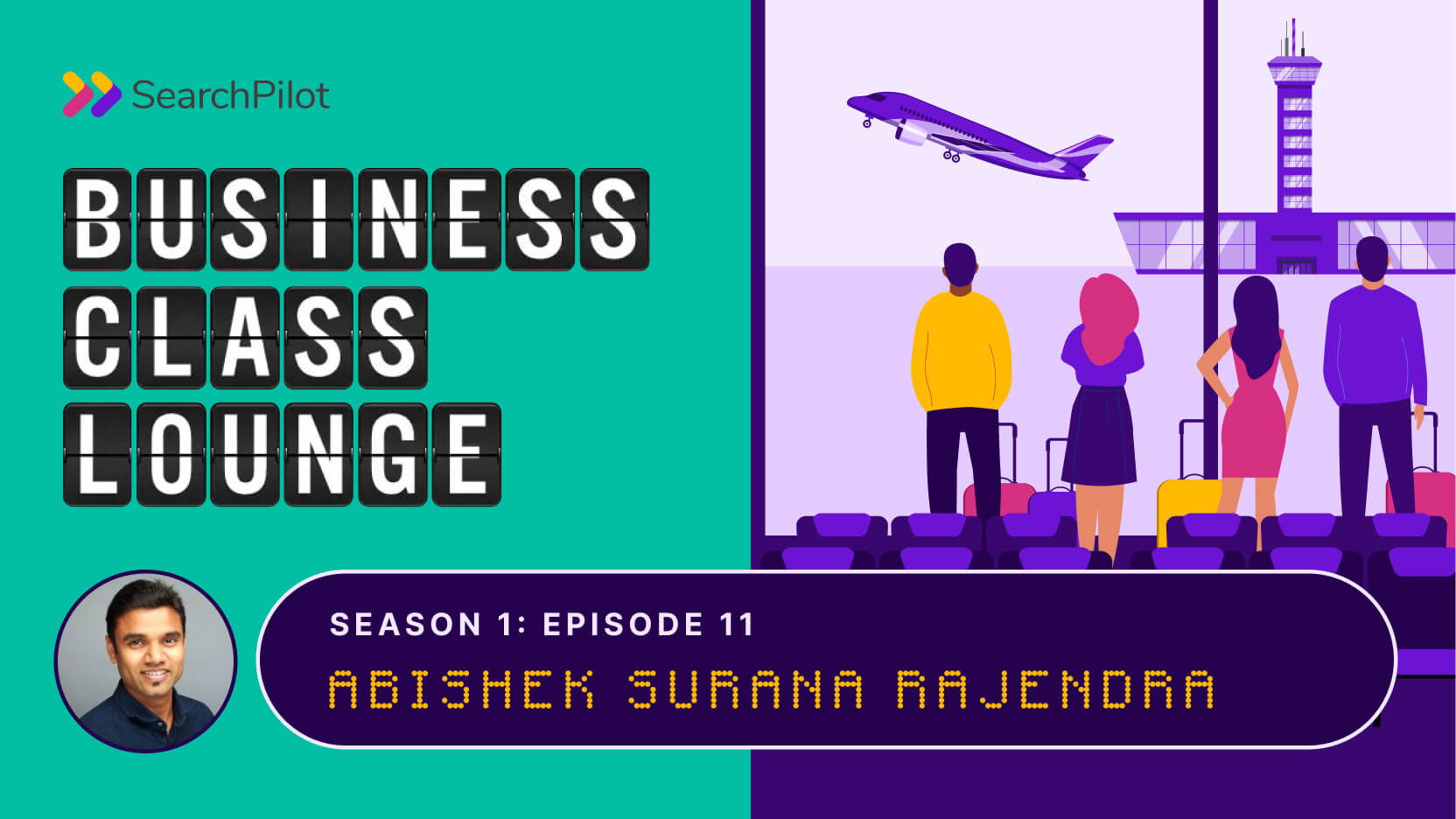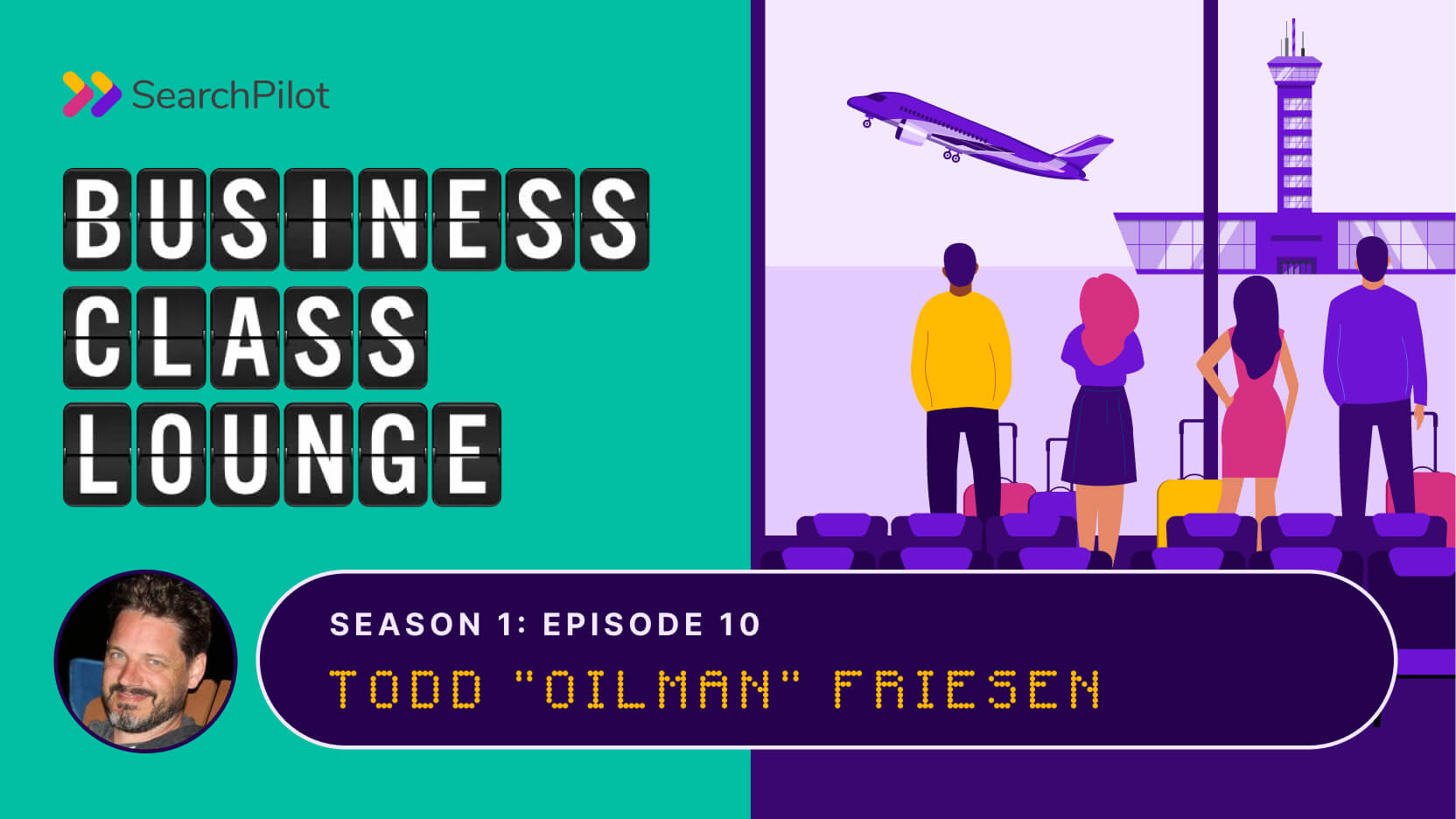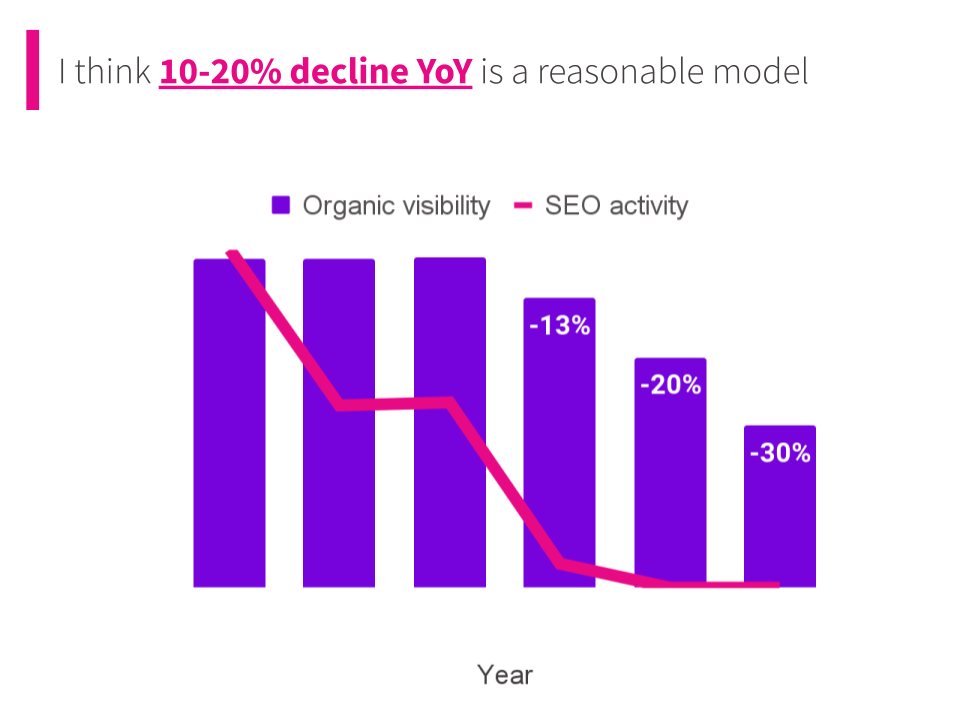I am excited for you to hear from Brian Provost. Brian has a deep understanding of news and media SEO more than anyone in the world. He worked at Define Media Group with many of the largest media properties globally and then ran search strategy at CBS Interactive and ViacomCBS. Since May 2022, he’s been GM for all of Search and SEO at Yahoo, which is a huge job. But if anyone can do it, he can. The work’s exciting. But as you’ll hear, there are a few areas where I believe Brian is head and shoulders above pretty much everyone. I was excited to find out how he works in those areas, and I’m sharing some of them here in this abridged version of the transcript.
Click the play button below if you want to jump straight to listening or head to wherever you get your podcasts.
You have an exceptional understanding and skill in communicating the value of organic search and the value of SEO to all kinds of stakeholders. Where does that come from?
Brian Provost (BP): I’ve always thought that’s actually one of the easiest parts and that it’s hard to argue against the value of organic search when it’s done well. When we look at the global macroeconomic conditions now, which are softening, search is always the one that holds up the best. It’s the last of the budgets to go if at all, and it’s the last of the investments to go, again if at all. It’s really hard to argue against somebody actively searching with high intent, probably close to the bottom of the funnel, whether it’s content, product, services, or whatever. It’s really hard to argue against that. So you have a tailwind to start with, right? You’re not coming in and trying to sell something that makes no sense or is a total reach. But I think I’ve always had a good group of mentors and friends on the business side that have coached me up and said, “Hey, here’s how to think about things or how the decisions are going to be made, how things are going to to be budgeted, and, how do you build consensus around that?” So I think I’ve been brought along well in that regard. And I’ve also always felt like at the end of the day, search is a scorecard for everything else that happens in a company. You can’t just be a link builder, you can’t just be a content producer. You can’t just be good on the monetization side. At the end of the day, it’s a scoreboard of who’s doing all those things. So I think the last thing that would help me in that is I think I’ve always been pretty good at taking that message, rallying everybody around it, letting them understand their slices of that pie or what impacts they can have against all of that. And then getting the whole team rallied around it. And we’ve been pretty successful at most of these places that we’ve been in. It may take a village to get these things done. And I think maybe I’ve done okay at getting the village to do what we need.
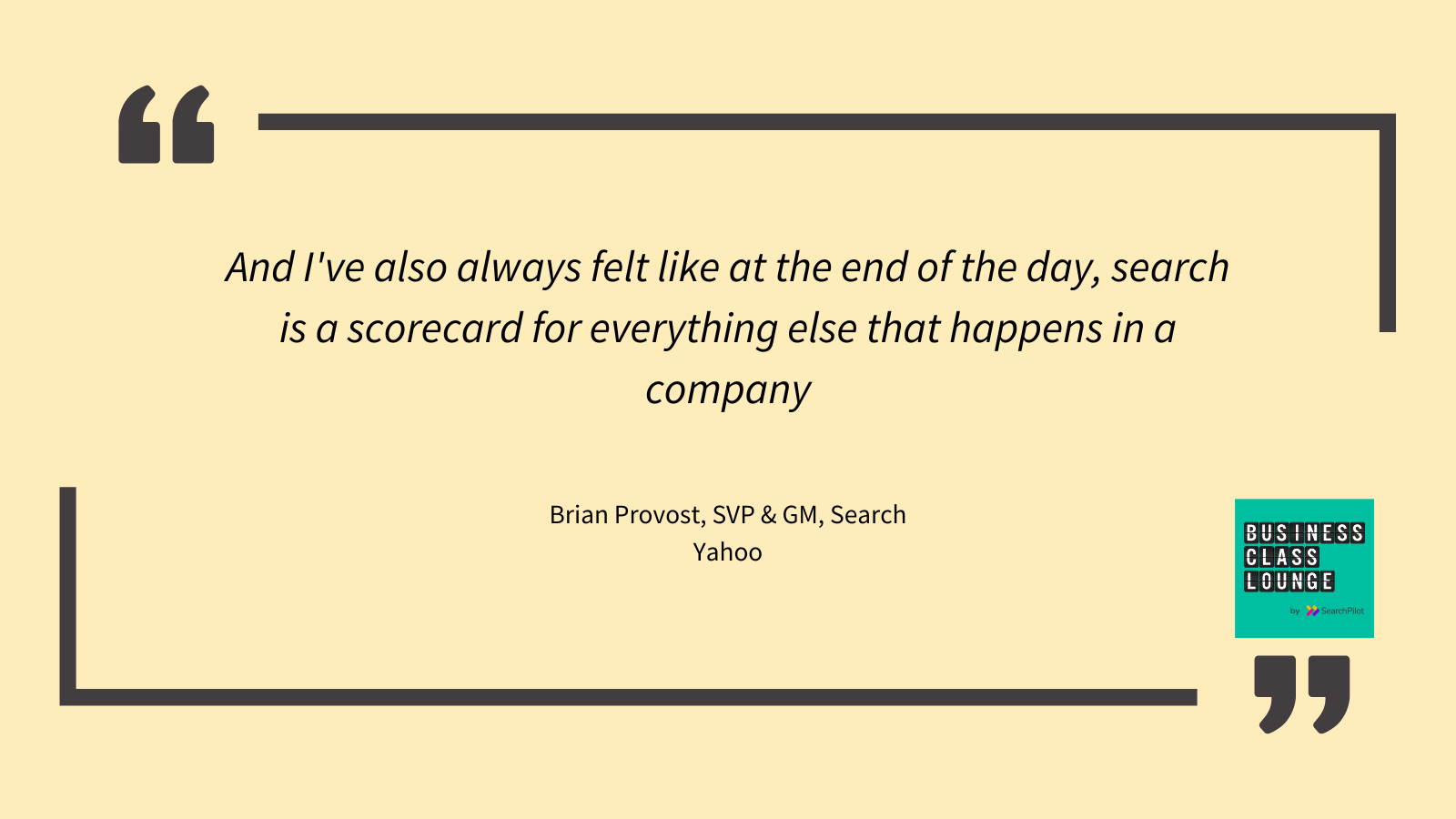
Looking back to your consulting years at Define Media Group, what are your best tips and tricks and advice for bringing folks on the journey who maybe aren’t arguing against the value of search but aren’t taking that to the next level and investing in it in the way that they could and they should?
BP: I think a lot of us jump back and forth between consulting and in-house, and I think there’s a ton of value in being on both sides of the table and learning from it. But the thing that we also did really well over there (in Define Media Group) is we were really good educators. We always went from - I call it the special forces model now, where you parachute in with a dozen folks and take over a country. You can’t do that by yourself. You have to work with, in that case, the indigenous population.
But in our case, the indigenous stakeholders in a business or whatever entity you have to educate, lock arms with them, and provide value. Show them value, show them interest, intensity and understanding.
Over time those reps build confidence, understanding, and then you get the knowledge transferred. We can talk to the C-suite all day long and get them super excited, but nothing really happens until it moves throughout the line. And as educators first in that regard, we got these teams strong and they’ll be able to perform out of muscle memory at the end of the day. And it’s the most resilient model. We were frankly working ourselves out of a job from day one. We say that because ironically most of our clients have been around for five to seven years. If you’re doing it right, that’s really the intent, you’ll know you’ve done well when you don’t have to be there, or you’re working on different things. The dovetail on that is once we got in, we never let them think of us as just, “Hey, we’re here to rearrange the title tags.” We did not want to be that level of SEO. We were very much invested in the business side pretty early, invested both at the operator level and at the business level; extended it into more digital strategy than pure SEO and ranking. That’s a portion of it. But to even be good at that, like I said, you have to be good at all the other facets, from tech to marketing to content production, and find all those efficiencies across an entire organization. I think we really did well at that and just, and it helps align everybody very early on.
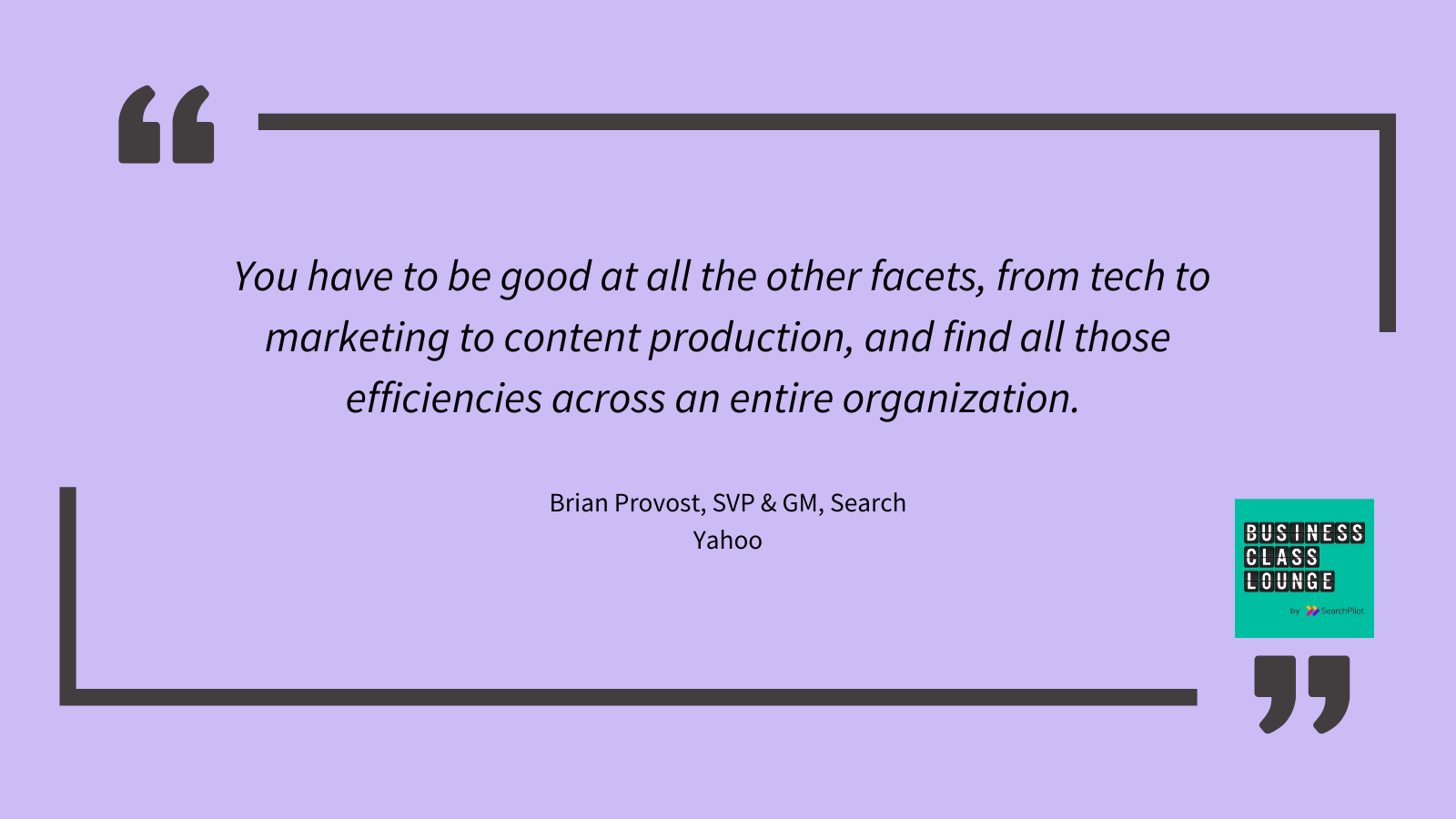
Have you had any good mental models for how to get folks to build out business plans or investment strategies based on the specifics of the search channel?
BP: Yeah, the first thing I think you gotta do is one, again, establish the high intent, like the audience you bring or the customers you bring are going to almost always be the highest converting segment they have. So let’s just set the stage and understand that this is something that you’re going to want to invest in. But also you have to give them a reasonable timeline on that. Organic search is, frankly, like trying to turn an aircraft carrier where it’s not something that happens as immediately as say, paid search or other direct models.
So you have to establish a reasonable timeline because if they think it’s going to happen tomorrow, it’s not. And then you have to start again showing them how it integrates into the broader strategy and how, frankly, organic search can just be a yield on all these other things happening in concert.
So they get really excited really quickly when they say, “Hey, you’re going to have this thing that’s super high margin contributing a real volume of users, okay, that’s the easiest sale in town.”
That’s the other thing too, if you’re just going to be the ‘title tag’ crew to just try to get things to rank, you might get some audience or some customers into the funnel but they’re not going to do anything when you’re working with all the other components of a business. They need to come in with high intent, then they’ll stick around, and they’ll become loyal users. So again, for us, it was much more of a user experience, a more comprehensive pitch than, “Hey, you’re going to see traffic go up 10% from organic search or a hundred percent or whatever.”
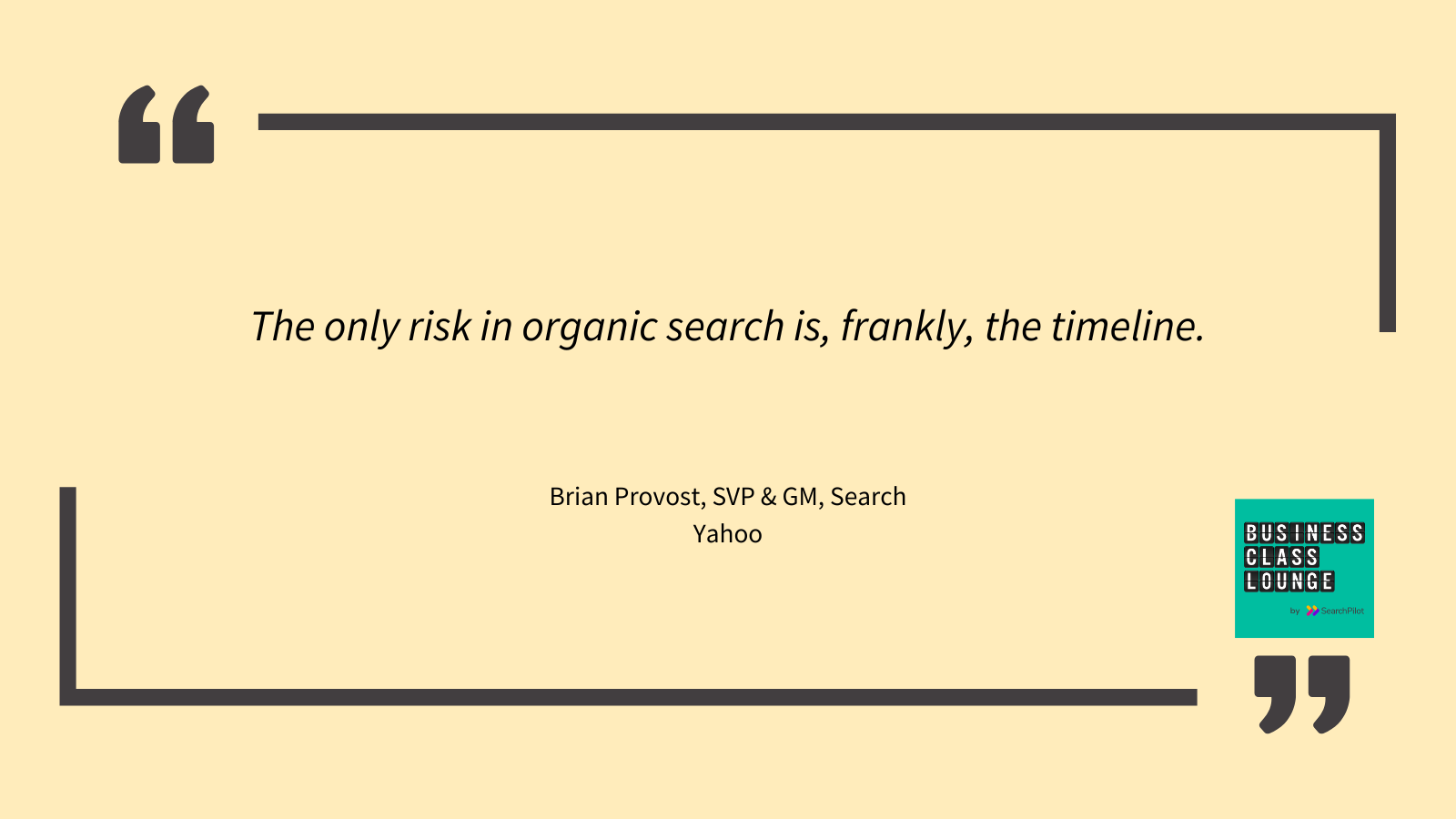
That’s why we never let ourselves get pigeon-holed on the consulting side because we were impacting all sorts of parts of the business. So again, easy sale to get you in the door with the executives. You start convincing the product-level folks that, “Hey, you’re not here just to make this interesting for robots or whatever. You’re here to compound the user experience or journey.” The tech people are usually happy that you’re aligned on, “Hey, we want things to be fast rendering, consistent, all those things.” It’s much easier for me to walk in the door and offer our services than folks that were trying to crank out another point of margin on something that is just less interesting or more of a risk. The only risk in organic search is, frankly, the timeline.
I’ve seen folks have changed jobs to move with you as you’ve moved your role around, even between organizations. I can’t really think of anyone else who’s had that pull, and that’s a superpower. What do you hear when you’re talking to those folks who’ve worked with you for a long time or in multiple different roles? Why do they do that? Why do they stick around? Why do they enjoy working with you?
BP: I don’t know. I’m blessed by having that. Even as I look at my team today, there’s people that have been with me for a while and have made this jump with me., It’s one of those things where it’s you think you’re good at some things, but I hope what I can do at a high level is carve out opportunities for them that are exciting, not just, “Hey, we all can pull a good paycheck these days.” These folks are so talented, they could pull a good paycheck anywhere. But I think what I always try to do is carve out a space for them to be good at what they are best at. Not just putting square pegs in square holes, but “Hey, I trust you. Your organization trusts you.” We’ll make these investments and go do what you do. And I think at least maybe I’ve been a good shield over the years for them to have the space to do that. Not going to lie. It’s easy when you have relationships with all these senior executives. And that’s maybe part of the skill set too, is that I’ve always had pretty good relationships with the senior executives or leaders of these entities as well.
And the trust they have in me becomes the trust they have in the team that I come with. But I just hope that people feel like, “Hey, they’ve had some fun and they’ve had fun because they’re allowed to do what they’re best at.”
Do you have any stories of times when you’ve had to put that shield up for folks working for you? Maybe there’ve been some bad results or something’s not gone to plan, or there’s been a bad outcome from a particular initiative or a particular project, and you’ve erected that shield around your team.
BP: I think the biggest one for me, the one I think maybe I’m most proud of was actually at the last place at Paramount, which was ViacomCBS, post-merger. There was a huge investment from broadcast into a linear model which was the focus of the business, then it became streaming. I think one of the smarter things I had some influence on and made a choice for the broader team was, “Let’s go ahead and park ourselves under this streaming group”. So fiscally, we had a shield above us while other parts of the business didn’t have that. So again, fiscally from the top, we’re going to be able to at least be resourced to go do what we need to do well, right? You can always make the case there are never enough total resources, but relatively, we were in a good place. And doing so, I also was able to align with one of the top executives who just really saw the value of us on the media side. And he just said “you guys go do what you’re best at”. The same thing I’m saying is you go do what you’re best at and at the level of competitiveness and the skill that y’all have, it’ll take care of itself. Everybody will see the value. And there are times when you have to explain to broadcast folks the value of a search user.
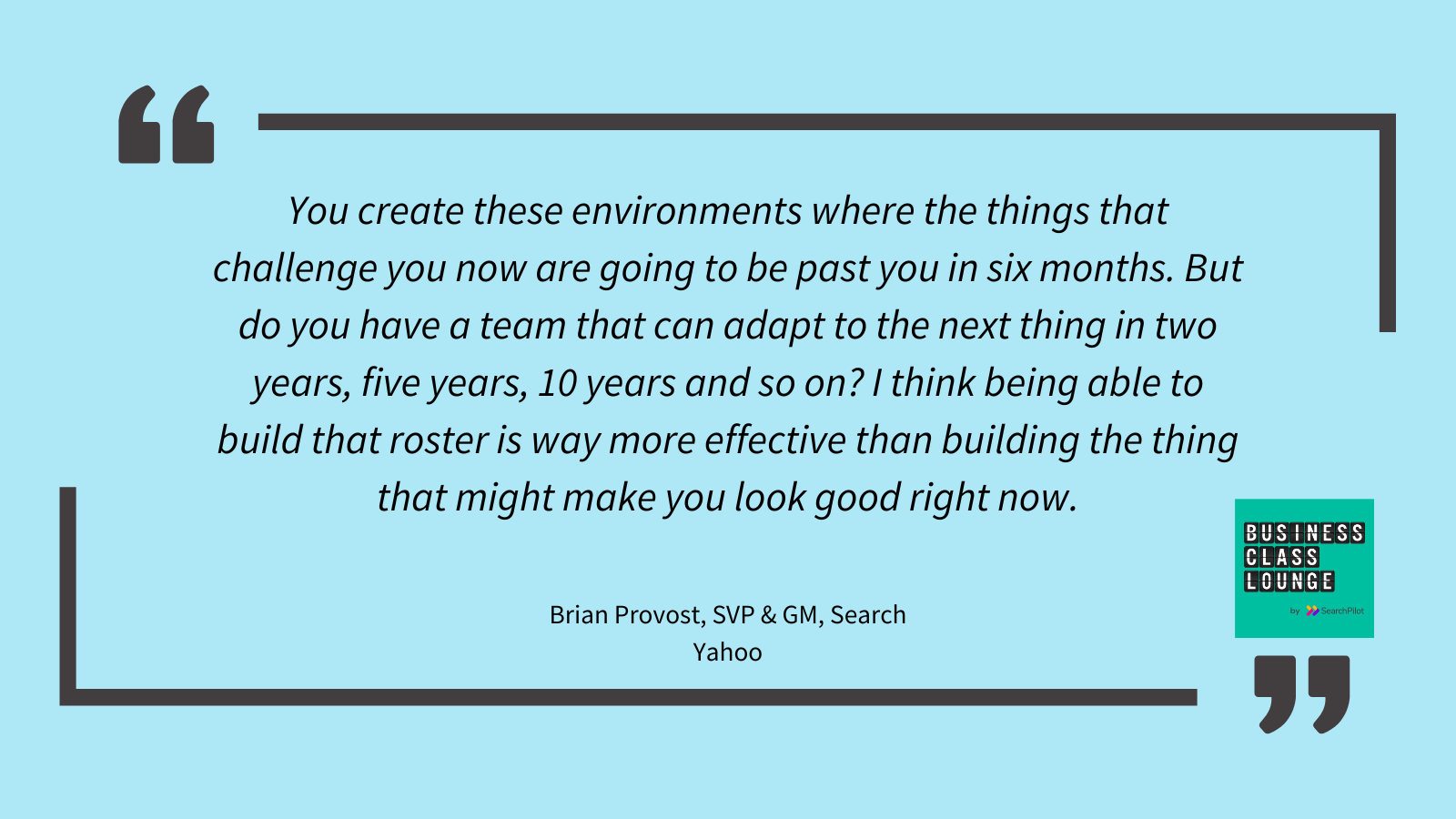
Again, it goes back to the educational component, but I just wanted the team to be good at what they’re going to do. The results would speak for themselves. If I could just provide them with that atmosphere to go do that. They went and expanded the perimeter, so to speak, far further than I ever would’ve thought of. And we also did a good job with that team - we went from being pure media play to media and commerce, right? We really hung our hats. If you’re going to build a commerce business, where are you going to find a higher intended audience for the product than organic search? So I think that’s one I’m most proud of if I was ever able to buy us a little bit of time to reinvent ourselves, is to become more aligned with the new version of a big company. I cashed in a lot of my chips at once but all of us look really good on that one. You create these environments where the things that challenge you now are going to be past you in six months. But do you have a team that can adapt to the next thing in two years, five years, ten years and so on? I think being able to build that roster is way more effective than building the thing that might make you look good right now.
What have you looked for in the folks you’ve worked for over the years? What is most important to you? In the same way that you said your team could go and get a paycheck, you could also decide where you want to work these days. What leads you to choose one particular individual?
BP: They have to want to. If you want to go back to basketball, I’m very much an MJ (Michael Jordan) and Kobe kind of person. And I think, again, this is inherent in a lot of us in the search and SEO worlds because we have a visible scoreboard in front of us every day. It’s the savage level of competitive desire that is attractive to me. And I think most of the bosses, I’ve not had many as I’ve been lucky and stayed around a long 10 years in a lot of places, but they all have almost a savage level of desire for what they believe in. It may not always be pure monetary performance. It may not be surrounded by a single KPI. It’s part of their soul they have to believe in the mission that we’re about to endeavor on together. And it’s been different, stylistically at every different place. But I look at Jim now, and you’re not going to find somebody as savagely competitive and have as much desire to transform this thing, and he’s done a fantastic job. He did it in the last place too. Just getting a culture built around the true desire to be something, and it’ll be different at every place. For a lot of people, that doesn’t exist. You’d be surprised at how many of these CEOs and senior executives just have a competitor’s desire to get paid. Maybe that’s a nice perk of the job, but they don’t really truly believe in the mission.
And the belief in the mission is something that just has to be there for me. It has to be there for the folks that work for me too. If you don’t believe in this, then don’t get on the bus. What are we doing here?
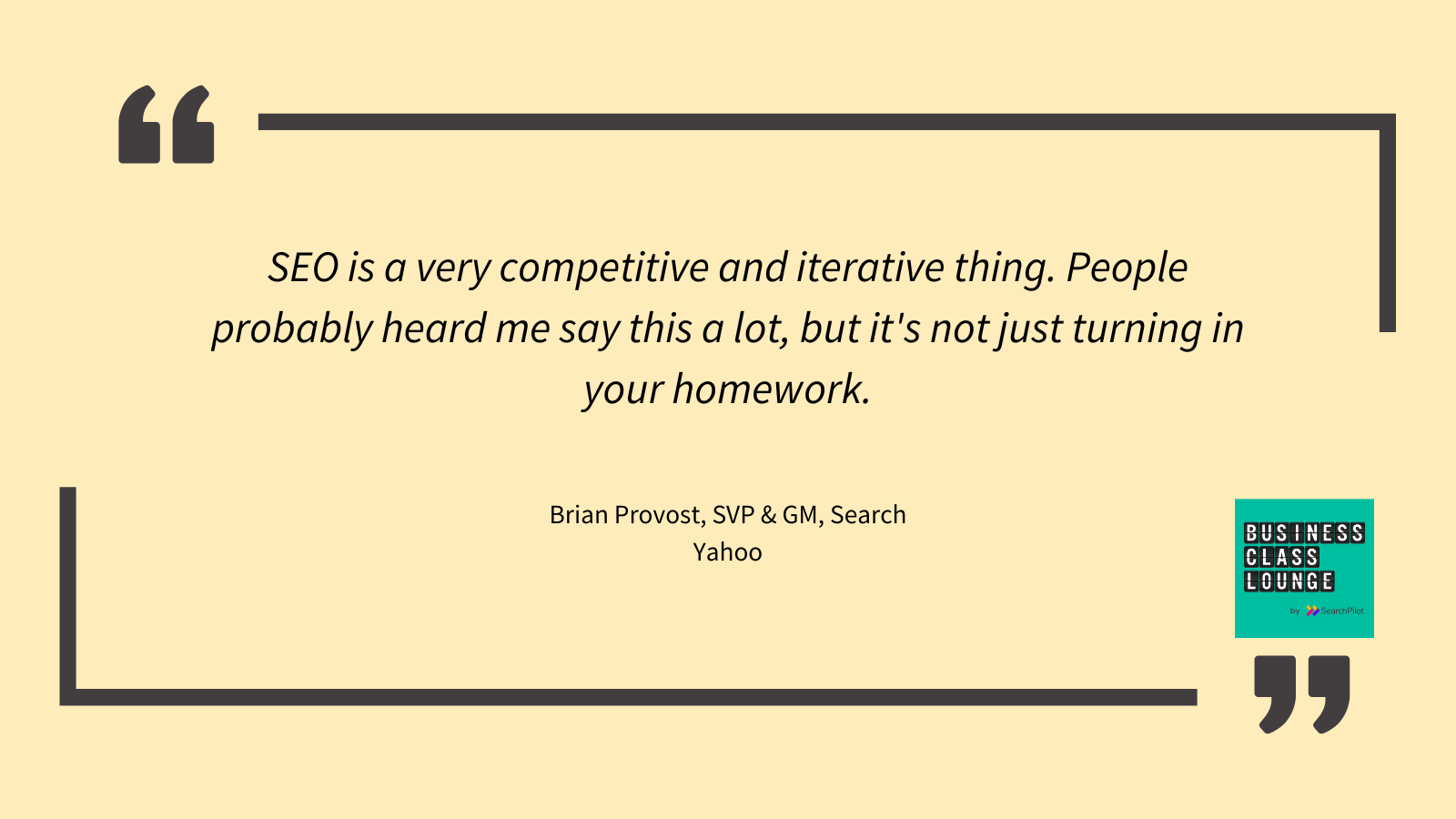
With the level of altitude that you need to maintain in the role that you are doing today, what are you asking your team or organization to report to you on? What do you want to know day in, day out, weekly or in a quarterly review style? What’s important to you?
BP: Yeah, so I got really lucky in this one, in that I brought Brian LaFrance over to work on my team. So Brian used to run CBS Sports for me, then went to The Athletic before he came over here. I’ve got somebody I’ve already worked with who’s gone through this pipeline with me before, and a lot of times we can finish each other’s sentences. We just know how each other works so we’ve got the alignment right off the bat there. He’s also bringing in what I think you’ll see are some other kind of Hall of Famers in the SEO world over here. We had a Hall of Fame squad over at the last place, and we’re absolutely going to do that and more over here. One of the more fun segues of the day-to-day for me is just going back and checking in on SEO. But I just want them to do the same thing that we did at the last place. Compete. SEO is a very competitive and iterative thing. People probably heard me say this a lot, but it’s not just turning in your homework. The middle innings is when you hit the publish button so what happens after that is usually a differentiator. There’s a lot of strong brands out there that we have to compete against. They’re all effective too. It’s how are we going to iterate and compete - whether it’s something evergreen, breaking news, or whatever. We are bringing in folks that believe that for you to do that, you have to have relationships and support with editorial, marketing, and tech. Again, all the functions around the business have to be SEO too, and that’s what that team’s going to have to do.
Further links
There are more great discussions like this, so head over to wherever you get your podcasts Apple, Spotify, Amazon, YouTube or you can catch the full episode directly from the feed here.
I’d love to hear your thoughts on this fifth episode, email me at podcast@searchpilot.com or send me a message on LinkedIn. You can also find Brian on LinkedIn and check out his work at Yahoo.
